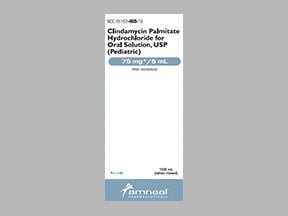
Clindamycin Palmitate Coupons & Savings Card – Discount Prices from $45.60
Generic for: Cleocin
My prescription
Edit
100ML of 75MG/5ML, Clindamycin Palmitate (3 Bottles)
Select pharmacy

CVS
$45.60
COUPON PRICE
Walgreens
$51.72
COUPON PRICE
Walmart
$56.04
COUPON PRICE
Albertsons
$58.70
COUPON PRICEClindamycin Palmitate savings card
Show this card to your pharmacist
CVS
$45.60
BIN
ID
PCN
GRP
019876
LHBAFD887A
CHIPPO
LHX
Powered by
More prescriptions for upper respiratory infection
More prescriptions for upper respiratory infection
Price history for Cleocin (brand) & Clindamycin Palmitate (generic)
3 Bottles, 100ML of 75MG/5ML
Average retail price for Cleocin
Average retail price for Clindamycin Palmitate
Average SaveHealth price for Clindamycin Palmitate
Our price history data is based on aggregated prescription data collected from participating pharmacies in America. Our prescription data updates daily to reflect the latest price changes. If you notice a missing data point, it means there wasn't sufficient data available to generate a monetary value for that date.
We analyzed Clindamycin Palmitate prices for (100ML of 75MG/5ML, 3 Bottles) over the last 12 months. The average retail price was $101.73, while the average price using the SaveHealth discount card was $58.95. That's a savings of approximately 42.05% when using our Clindamycin Palmitate coupon.
Compared to the generic version, Cleocin had an average price of $120.64 over the same time period. With the SaveHealth savings card, Clindamycin Palmitate is 51.14% cheaper on average than Cleocin.
*Retail prices are based on pharmacy claims data, and may not be accurate when we don't have enough claims.
Clindamycin Palmitate dosage forms
Dosage Quantity Price from Per unit 100ML of 75MG/5ML 3 Bottles $45.60 $15.20 100ML of 75MG/5ML 1 Bottle $20.35 $20.35 100ML of 75MG/5ML 2 Bottles $36.50 $18.25 100ML of 75MG/5ML 4 Bottles $54.70 $13.68 100ML of 75MG/5ML 6 Bottles $72.90 $12.15
| Dosage | Quantity | Price from | Per unit |
|---|---|---|---|
| 100ML of 75MG/5ML | 3 Bottles | $45.60 | $15.20 |
| 100ML of 75MG/5ML | 1 Bottle | $20.35 | $20.35 |
| 100ML of 75MG/5ML | 2 Bottles | $36.50 | $18.25 |
| 100ML of 75MG/5ML | 4 Bottles | $54.70 | $13.68 |
| 100ML of 75MG/5ML | 6 Bottles | $72.90 | $12.15 |
Clindamycin Palmitate Warnings
Clindamycin Palmitate Side Effects
Common side effects:
- Nausea
- Vomiting
- Upset stomach
- Mild diarrhea
Less common but important to monitor:
- Oral thrush
- Vaginal yeast infection
Serious side effects:
- Sore or painful throat
- Joint pain or swelling
- Yellowing of the eyes or skin
- Signs of kidney problems like changes in urine output
- Very serious allergic reaction symptoms such as persistent fever
- New or worsening lymph node swelling
- Rash
- Itching or swelling (especially of the face, tongue, or throat)
- Severe dizziness
- Difficulty breathing
Clindamycin Palmitate Interactions
When taking clindamycin palmitate, it's important to be aware of potential interactions with other medications:
Neuromuscular Blocking Agents: Clindamycin may enhance the effects of drugs that relax muscles during surgery, such as succinylcholine and vecuronium. This can lead to prolonged muscle relaxation. If you're scheduled for surgery, inform your healthcare provider that you're taking clindamycin.
Erythromycin: Using clindamycin alongside erythromycin, another antibiotic, can reduce the effectiveness of both medications. It's advisable to avoid taking these two antibiotics together.
Live Bacterial Vaccines: Clindamycin may decrease the effectiveness of live bacterial vaccines, such as the typhoid vaccine. If you're planning to receive any vaccinations, inform your healthcare provider about your clindamycin use.
Always discuss your current medications and any planned medical procedures with your healthcare provider to ensure safe and effective use of clindamycin palmitate.
